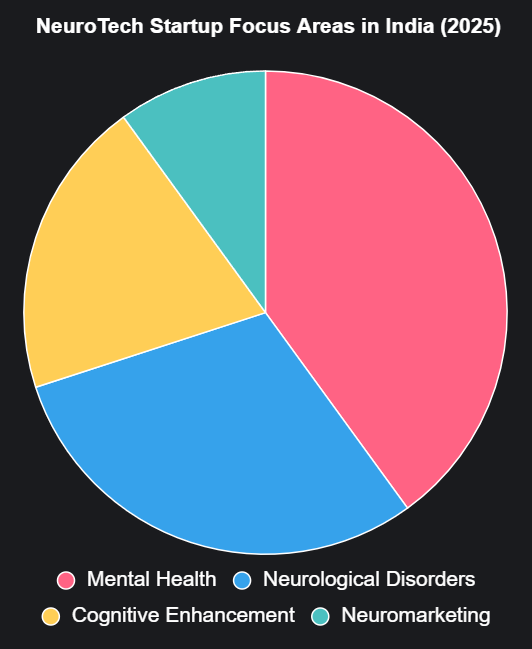NeuroTech Startups in India: Trailblazing Innovation or Overblown Hype?
India’s neurotechnology sector is gaining momentum, merging neuroscience with cutting-edge technology to tackle mental health, neurological disorders, and cognitive enhancement. With startups like NeuroLeap, BrainSightAI, and Unwired India leading the charge, the promise of transforming lives is palpable. Yet, as funding surges and media spotlight intensifies, questions arise: Are these startups delivering scientific breakthroughs or fueling exaggerated expectations? This article dives into India’s neurotech ecosystem, exploring its achievements, challenges, and the delicate balance between innovation and hype, complete with data-driven insights.
Table of Contents
The Surge of NeuroTech in India
India’s neurotech scene is thriving, with over 40 startups focusing on neurology and brain-computer interfaces (BCIs), per a 2025 Tracxn report. Driven by rising mental health awareness and an estimated 150 million Indians affected by neurological disorders, these companies are positioning India as a global neurotech contender. Key hubs in Bangalore, New Delhi, and Mumbai are fostering innovation, supported by government initiatives like BIRAC and increasing venture capital interest.
Notable players include NeuroLeap, which uses quantitative electroencephalography (QEEG) and neurofeedback to enhance focus and emotional balance. BrainSightAI leverages AI and MRI imaging for early neuropsychiatric diagnosis, securing $750K in seed funding in 2021. Unwired India, backed by Y Combinator Startup School, develops non-invasive neurostimulation devices and nootropics to address cognitive health.
Table 1: Leading NeuroTech Startups in India (2025)
| Startup | Focus Area | Key Product/Service | Funding/Recognition |
|---|---|---|---|
| NeuroLeap | Brain assessment & enhancement | QEEG-based neurofeedback | Trusted by high-profile clients, undisclosed funding |
| BrainSightAI | Neuropsychiatric diagnostics | AI-powered MRI analysis | $750K seed funding (2021) |
| Unwired India | Non-invasive neurostimulation | Nootropics & neurotech devices | Y Combinator Startup School, Microsoft-backed |
| TerraBlue XT | Wearable neurotech | TJay wearable for neurological monitoring | Recognized by UN, Niti Aayog |
| Neuphony | Brainwave analysis & neurofeedback | Real-time EEG data wearables | Undisclosed, focus on mental fitness |
Science vs. Hype: Where Do We Stand?
Neurotech’s potential is vast: non-invasive devices for brain monitoring, AI-driven diagnostics, and BCIs that could enable thought-controlled interfaces. TerraBlue XT’s “TJay” wearable, for instance, monitors biopotential signals to manage neurological disorders, earning UN recognition. BrainSightAI’s platform simplifies complex brain data for clinicians, aiding early diagnosis of conditions like dementia.
However, skepticism persists. Technologies like neurofeedback and EEG, central to many startups, lack large-scale, peer-reviewed studies to confirm efficacy for conditions like ADHD or depression. Critics argue that claims of “improved focus” or “emotional regulation” often outstrip evidence, risking consumer trust. NeuroLeap’s proprietary protocols, while effective for some, face questions about scalability and scientific rigor.
Graph 1: Investment Trends in Indian NeuroTech Startups (2015–2025)
The chart below visualizes funding growth in India’s neurotech sector, based on data from Tracxn and StartUs Insights:

Insights:
- Steady Growth: Funding has risen from $0.5M in 2015 to $20M in 2025, reflecting growing investor confidence.
- Startup Proliferation: The number of funded startups has increased, with 8 securing investment in 2025.
- Small Deal Sizes: Despite growth, Indian neurotech funding lags behind global giants like Blackrock Neurotech ($200M in 2024), indicating capital constraints.
Graph 2: Application Areas of Indian NeuroTech Startups
The chart below breaks down the focus areas of India’s neurotech startups, highlighting their diversity:

Insights:
- Mental Health Dominates: 40% of startups focus on mental health solutions, driven by rising demand for anxiety and depression treatments.
- Neurological Disorders: 30% target conditions like epilepsy and dementia, addressing India’s significant disease burden.
- Emerging Areas: Cognitive enhancement (20%) and neuromarketing (10%) are growing but raise ethical concerns.
Challenges: Navigating Roadblocks
India’s neurotech sector faces significant hurdles:
- Regulation: The Drug Controller General of India’s evolving Medical Device Rules create approval delays.
- Talent Shortage: A lack of neuroscientists and specialized engineers limits innovation.
- Funding: Smaller deal sizes compared to global counterparts hinder scaling.
- Ethics: BCIs and neuromarketing raise privacy and autonomy concerns, especially without robust regulations.
Table 2: Key Challenges in Indian NeuroTech
| Challenge | Description |
|---|---|
| Regulatory Uncertainty | Delays in medical device approvals due to evolving regulations |
| Talent Shortage | Limited neuroscientists and engineers for advanced R&D |
| Funding Constraints | Smaller deal sizes compared to global neurotech leaders |
| Ethical Concerns | Risks of data privacy violations and neuromarketing misuse |
| Scientific Validation | Limited large-scale studies for neurofeedback and EEG-based solutions |
The Path Forward: Innovation with Accountability
India’s neurotech startups hold immense potential to address healthcare challenges, but success depends on overcoming current limitations. Collaborations with institutions like IITs and NIMHANS, as seen with BrainSightAI, can enhance scientific credibility. Government support through BIRAC’s BIG grants aids clinical validation. Startups must prioritize transparency, rigorous trials, and ethical frameworks to build trust and avoid the pitfalls of hype.
Conclusion
India’s neurotech startups are at a pivotal moment, blending innovation with the promise of transforming mental and neurological health. While their ambition is commendable, the sector must ground its claims in robust science to avoid being dismissed as hype. With strategic investments, regulatory clarity, and ethical safeguards, India’s neurotech ecosystem can lead globally, delivering impactful solutions for millions.
also read : India’s AI Stack Triumphs: Can Startups Outshine Global Big Tech?
Last Updated on: Saturday, July 26, 2025 3:29 pm by Siddhant Jain | Published by: Siddhant Jain on Saturday, July 26, 2025 3:01 pm | News Categories: Technology, Education News, Latest News, News, Trending


